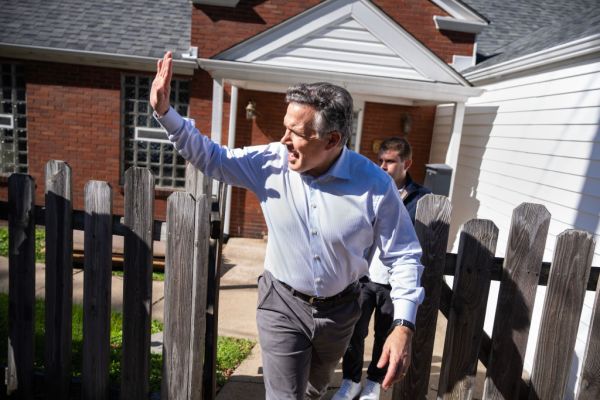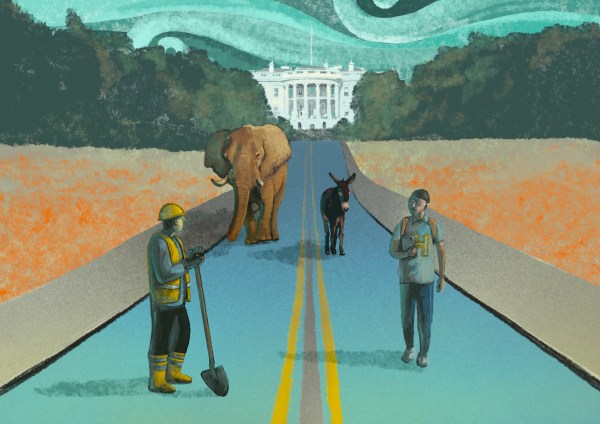Editor’s Note: Although partisans on both sides of the aisle have warned that the stakes of the upcoming presidential election could not be higher, the two campaigns themselves have been remarkably light on policy substance. With Election Day now less than a month away, we reached out to dozens of thinkers, writers, and analysts we trust with a simple question: What are your biggest policy concerns about a potential Trump or Harris administration? We will be publishing their responses—broken up thematically—in the coming days and weeks.
Today’s entry focuses on social policy—which runs the gamut from education, to abortion, to guns. Our experts don’t see much daylight on the candidates’ views on drug legalization or abortion, and not much policy at all when it comes to education. On gun policy, expect efforts at gun control to be rebuffed by the courts. And look for either candidate to clamp down on online speech.
Both Trump and Harris are short on education policy details.
Policy-free politics seem to be the order of the day, neglecting serious, workable ideas, much less meaningful discussions, about how to govern.
That’s especially worrisome today when it comes to education, an area in desperate need of attention. What makes this dearth of proposals all the more remarkable is that most of our top education challenges are rightly understood as nonpartisan. They don’t neatly map onto contemporary ideological battles, meaning we could strive for consensus solutions.
For instance, chronic absenteeism in K-12 education is a staggering problem. Students just aren’t going to school. How do we address that? Students aren’t learning nearly enough in reading, math, and civics. What’s to be done? How should we reform postsecondary education given the rapid growth of both “nontraditional” students and nontraditional credentials like certificates, licenses, and badges?
I find it difficult to understand what Donald Trump thinks about such education topics. That’s because of his uninformed, philosophy-free, self-focused, mercurial perspective on governing.
Contemporary Democrats face a different problem. When it comes to education, America’s left still hasn’t fully recovered from the backlash to the overreach of the Barack Obama-Arne Duncan era. Widespread public resentment about presumptuous federal officials meddling in schools boiled over. That seems to have chastened a generation of left-of-center leaders who would’ve otherwise encouraged more spending and direction from Washington, D.C.
So when I listen to Trump on education or read Harris’ education-lite agenda, I’m struck by the similarities. Neither seems to know exactly what they want Uncle Sam to do and not do.
It actually wouldn’t be all that bad if this confusion caused both sides to simply stand down on school matters. Smart and able state, local, and civil-society leaders can certainly lead instead of Washington. Unfortunately, that’s not likely to happen. Instead, we’ll probably get two types of responses. The first is typified by President Joe Biden’s unwise, unlawful, and expensive student-loan-forgiveness gambit. That is, instead of having a sober, extended national discussion about an essential issue (here, how best to invest in postsecondary schooling), political considerations will produce flashy, imprudent executive actions. The second is appeasing base voters by leaning into the day’s most radioactive issues, thereby contaminating conversations about important issues.
In short, I’m concerned that the toxic politics of the last decade-plus, instead of the genuine needs of students, families, and schools, will shape federal education policy post November.
—Andy Smarick is a senior fellow at the Manhattan Institute focusing on education and civil society.
Both candidates look poised to ease restrictions on marijuana.
Former President Donald Trump has signaled his support for liberalizing marijuana laws, including decriminalizing and rescheduling the drug, and saying he would sign legislation that would in effect end its federal prohibition. Vice President Kamala Harris has made a full-throated endorsement of legalization, recently announcing a nationwide legal weed proposal.
Either a Trump or Harris administration, then, could spell the end of marijuana prohibition—even without a compliant Congress. Dropping pot from the federal schedule of controlled substances can be done by the attorney general, and while Congress can intervene, its assent is not by default needed.
Doing so would obviously be politically popular: 70 percent of Americans support marijuana legalization, with a small but vocal group seeing legalization as among the most important issues facing America today.
But while it would be popular, it would also be foolhardy. Full federal legalization would break the dam on interstate commercialization, and 24 marijuana markets—however dysfunctional they already are—would be replaced by one common market.
That means no more mom-and-pop state-legal weed. A handful of large marijuana companies could grow marijuana in the most conducive spots and sell it everywhere. Unencumbered by a federal prohibition, they’d enjoy full access to the deeply capitalized American financial system, as well as the ability to take tax deductions they currently cannot. The result would be a market of unprecedented efficiency—imagine a joint selling for pennies.
This might be appealing if marijuana were benign, but it of course is not. As I’ve written for The Dispatch, it’s an addictive, harmful substance, responsible for juvenile hospitalizations, car crashes, schizophrenia, and homelessness. Americans are starting to recognize this, which is why, in a recent Gallup poll, a majority for the first time said marijuana was a negative for society and most people who use it.
They are, in essence, correct. And it is sad that both Trump and Harris hold the voting public in such low regard that they see increasing the availability of a vicious substance as a political enticement. Americans may not know what full federal legalization will do to them and their communities. But, almost regardless of who wins, they are soon likely to find out.
—Charles Fain Lehman is a fellow at the Manhattan Institute whose work focuses on policing and public safety.
Neither candidate will deliver what traditional conservatives have looked for on abortion.
Millions of pro-life voters will vote for Donald Trump this November in the interest of forestalling Kamala Harris’ progressive agenda. And they’re undoubtedly correct to assume that a Harris administration would continue the Biden administration’s efforts to, in the words of the ACLU, use “nearly every executive tool available to protect and expand access to abortion and contraceptive care.” Whether pressuring conservative states to expand their definition of “emergency” abortion access, seeking to use Medicaid dollars to fund travel costs for women seeking abortions, or getting rid of regulations around the abortion drug mifepristone, the Biden administration’s actions to use the executive branch to expand access to abortion would continue under a potential President Harris. But steps beyond that, like creating a federal right to abortion, would require congressional action, something that our Madisonian system of checks and balances will make difficult unless there is an unlikely Democratic trifecta.
These pro-life voters will rightfully expect a second Trump term to, at a bare minimum, bring some of these aggressive executive actions to an end. Solid conservative appointments to key regulatory bodies could undo some of the Biden-era policies—if they are not undercut by a president who knows his biggest political weakness is the topic of abortion. His influence on a party still fumbling in the aftermath of the Dobbs decision may be the biggest cause for concern. But abortion isn’t the only issue on which Trump’s idiosyncratic policy preferences may lead the GOP in all sorts of unhelpful directions. President Trump would put political weight behind unsound but facially popular economic populism like levying broad-based tariffs via executive action, appointing hard money true believers to the Federal Reserve, and pushing campaign giveaways like “No Tax on Tips.” Republican members of Congress would have to explain to their primary voters why they opposed his policy gimmicks, like his expensive and morally fraught endorsement of taxpayer-funded universal access to IVF. Thus, a second Trump administration would also exert an almost-irresistible force that would continue the GOP’s shift away from prioritizing fiscal sanity and the cause of protecting unborn life, even as it forestalls the possibility of worse outcomes under a potential President Harris.
—Patrick T. Brown is a fellow at the Ethics and Public Policy Center whose work focuses on family policy.
Dynamics in Congress and the Supreme Court likely limit future gun policy.
Kamala Harris and Donald Trump couldn’t be farther apart on the gun policies they’d enact if they win in November. But barring unprecedented changes to our politics or even system of government, the practical outcome of each may not be as stark.
After a walkback of her 2019 support for mandatory buybacks of “assault weapons”—such as the popular AR-15 rifle—Harris is currently running on the same gun policy platform President Joe Biden was running on before he dropped out. While she hasn’t flushed out the policy details, she has broadly backed universal background checks, “red flag” laws, and a ban on the sale of assault weapons.
For his part, Trump hasn’t spoken much about specific policy proposals during the campaign. He has backed national reciprocity for gun-carry permits and said he opposed a ban on AR-15s—even after being shot with one.
None of those proposals seem likely to get far in Congress, though. That could change if the Senate nukes the filibuster. That’s something Democrats—including Harris—have pushed for, but their outlook for retaining control of the Senate isn’t promising.
Even if Harris managed to get something like an assault weapons ban passed into law, it is also less likely to survive a court challenge than ever before, thanks to the Supreme Court’s new Bruen standard. Since several challenges to state bans are already percolating up to the court, it could find the policy unconstitutional before a potentially victorious Harris even takes office. Harris could flip the ideological tilt of The Court, especially by changing the number of justices–but that effort faces the same challenge as nuking the filibuster.
That leaves executive actions as the most realistic place for movement on guns, though that too would be limited. Trump used the Bureau of Alcohol, Tobacco, Firearms, and Explosives (ATF) to unilaterally institute a ban on bump stocks, and the Biden administration has aggressively expanded on that precedent by issuing several more ATF rules restricting things like unserialized firearms and millions of pistol-brace-equipped firearms.
But the Supreme Court has already struck down Trump’s bump stock ban, and will decide on the constitutionality of Biden’s “ghost gun” kit ban later this term.
Still, Trump likely has more room to affect American gun regulation using executive powers. For starters, he can (and has already promised to) fire the ATF Director, whom gun rights advocates have said is politicized. He could also order the agency to rescind the zero-tolerance policy the Biden administration has implemented, which has greatly increased the rate of gun dealer license revocations that have angered the industry.
Of course, Trump may try to upend the system in unprecedented ways, too. He’s said he wants to be a dictator for a day, suspend parts of the Constitution, or give local police a “one really violent day” to deal with crime—all of which could have implications when it comes to guns.
Getting any of the major gun legislation that’s been hotly debated for literally decades through Congress and into law would be a herculean task for both Harris and Trump—and would require either a major reworking of our government or our politics.
—Stephen Gutowski is the founder of The Reload, a news outlet focusing on firearms policy reporting and analysis.
Get ready for more government control of online speech.
There are many ways in which another Donald Trump presidency could be uniquely bad, and many ways in which a Kamala Harris presidency could be uniquely bad. I’m particularly appalled by the prospect of more of Trump’s immigration policy agenda and rhetoric, and the prospect of Harris’ economic policy agenda and rhetoric. But I want to focus now on an area in which Trump and Harris are equally likely to be bad: the realm of regulating tech companies and allowing free speech to flourish online.
Both candidates have a nasty history on this front. During Trump’s prior tenure as president, he tried to kill TikTok via executive order, pushed for Congress to abolish Section 230 of the Communications Decency Act (a law without which we would see much more suppression of online speech), and tried to use the Federal Communications Commission to undermine Section 230, too.
As attorney general of California, Harris pushed for federal lawmakers to revise Section 230 and prosecuted the operators of an online classified ad platform on bogus pimping charges. As a senator, Harris supported legislation—the Allow States and Victims to Fight Online Sex Trafficking Act (FOSTA), signed into law by Trump—that ended up seriously chilling online speech related to sex and relationships while making it more difficult to stop abuse and exploitation in the sex trade. And as vice president, she’s been part of an administration abusing antitrust law to try and cripple popular tech companies, with no signal that she would stop this if she’s running the show.
Both Republicans and Democrats in Congress are eager to further micromanage social media and online speech broadly in the name of childproofing the internet, and both have called for things like forced breakups of big tech companies. So there will be no shortage of pressure on either Trump or Harris to back these congressional efforts and orient federal administrative agencies toward these goals as well. The justifications that Trump and Harris use for such moves may differ, but the result will be the same stifling of both free speech and free markets and the same shift toward putting the government in more control over everything we do and see online.
—Elizabeth Nolan Brown is a senior editor at Reason, where she writes the “Sex & Tech” newsletter.






Please note that we at The Dispatch hold ourselves, our work, and our commenters to a higher standard than other places on the internet. We welcome comments that foster genuine debate or discussion—including comments critical of us or our work—but responses that include ad hominem attacks on fellow Dispatch members or are intended to stoke fear and anger may be moderated.
With your membership, you only have the ability to comment on The Morning Dispatch articles. Consider upgrading to join the conversation everywhere.